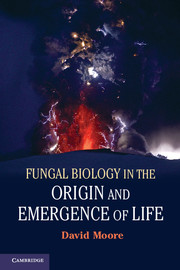Book contents
- Frontmatter
- Contents
- 1 Learning from life on Earth in the present day
- 2 Essentials of fungal cell biology
- 3 First, make a habitat
- 4 The building blocks of life
- 5 An extraterrestrial origin of life?
- 6 Endogenous synthesis of prebiotic organic compounds on the young Earth
- 7 Cooking the recipe for life
- 8 ‘It’s life, Jim . . .’
- 9 Coming alive: what happened and where?
- 10 My name is LUCA
- 11 Towards eukaryotes
- 12 Rise of the fungi
- 13 Emergence of diversity
- References
- Index
11 - Towards eukaryotes
Published online by Cambridge University Press: 05 February 2013
- Frontmatter
- Contents
- 1 Learning from life on Earth in the present day
- 2 Essentials of fungal cell biology
- 3 First, make a habitat
- 4 The building blocks of life
- 5 An extraterrestrial origin of life?
- 6 Endogenous synthesis of prebiotic organic compounds on the young Earth
- 7 Cooking the recipe for life
- 8 ‘It’s life, Jim . . .’
- 9 Coming alive: what happened and where?
- 10 My name is LUCA
- 11 Towards eukaryotes
- 12 Rise of the fungi
- 13 Emergence of diversity
- References
- Index
Summary
Prokaryotes have dominated the Earth for the bulk of its history (I have put that statement in a tense that suggests they do not dominate the Earth now, but the truth might be other than this). LUCA must have emerged close to the start of the Archaean Eon, about 3.8 billion years ago, because, as noted above, some of the oldest microbial fossils are fully differentiated, photosynthetic bacteria (cyanobacteria) found in Western Australian sediments that are 3.5 × 109 years old (Boal & Ng, 2010; Derenne et al., 2008; Schopf, 1993). By contrast, eukaryotes are generally thought to have appeared no earlier than about 1.5 billion years ago (and some people put their emergence somewhat later than that). So, for at least 2 billion years the only living organisms on the planet were prokaryotes together, presumably, with their associated viruses.
On the basis of protein sequence comparisons, LUCA probably had a complexity comparable to that of a simple modern bacterium and lived 3.2–3.8 billion years ago (Orgel, 1998). The abundant biological activity in the deep ocean volcanic hydrothermal systems of the present day, most of it being dependent on chemosynthesis rather than photosynthesis, has stimulated the widespread appeal of the theory promoting a ‘deep hot’ origin of life, and particularly Günter Wächtershäuser’s argument linking the chemistry of submarine deep ocean vents with the origin of life (Alpermann et al., 2010; Wächtershäuser, 2006):
Wächtershäuser asserts that life originated on the surface of iron sulfides as a result of such chemistry. The assumptions that complex metabolic cycles self-organize on the surface and that the significant products never escape from the surface are essential parts of this theory; in Wächtershäuser’s opinion, there never was a prebiotic soup!
(Orgel, 1998)- Type
- Chapter
- Information
- Fungal Biology in the Origin and Emergence of Life , pp. 142 - 156Publisher: Cambridge University PressPrint publication year: 2013



